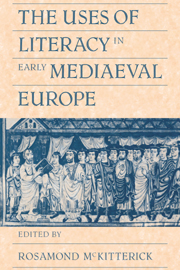Book contents
- Frontmatter
- Contents
- List of illustrations
- Contributors
- Preface
- Abbreviations
- Introduction
- 1 Literacy in Ireland: the evidence of the Patrick dossier in the Book of Armagh
- 2 Anglo-Saxon lay society and the written word
- 3 Administration, law and culture in Merovingian Gaul
- 4 Literacy and the papal government in late antiquity and the early middle ages
- 5 Literacy and the laity in early mediaeval Spain
- 6 Aspects of mediaeval Jewish literacy
- 7 Writing in early mediaeval Byzantium
- 8 Literacy displayed: the use of inscriptions at the monastery of San Vincenzo al Volturno in the early ninth century
- 9 Royal government and the written word in late Anglo-Saxon England
- 10 Literacy in Carolingian government
- 11 Text and image in the Carolingian world
- Conclusion
- Index
1 - Literacy in Ireland: the evidence of the Patrick dossier in the Book of Armagh
Published online by Cambridge University Press: 07 December 2009
- Frontmatter
- Contents
- List of illustrations
- Contributors
- Preface
- Abbreviations
- Introduction
- 1 Literacy in Ireland: the evidence of the Patrick dossier in the Book of Armagh
- 2 Anglo-Saxon lay society and the written word
- 3 Administration, law and culture in Merovingian Gaul
- 4 Literacy and the papal government in late antiquity and the early middle ages
- 5 Literacy and the laity in early mediaeval Spain
- 6 Aspects of mediaeval Jewish literacy
- 7 Writing in early mediaeval Byzantium
- 8 Literacy displayed: the use of inscriptions at the monastery of San Vincenzo al Volturno in the early ninth century
- 9 Royal government and the written word in late Anglo-Saxon England
- 10 Literacy in Carolingian government
- 11 Text and image in the Carolingian world
- Conclusion
- Index
Summary
Ireland was culturally, as well as geographically, peripheral to early mediaeval Europe. In some ways, early mediaeval Ireland was shaped by the common western European inheritance, the twin legacy of imperial Rome and Christianity, but in others, it was completely anomalous. Although individual Irishmen contributed a great deal to the development of European culture, and, conversely, there is much in the history of early Ireland which should be seen in terms of the Empire and its aftermath, the fact that Ireland was never conquered by Rome resulted in radically different social and political developments of which literacy is both an example and a symptom. For instance, it has become something of a truism that literacy finds its natural environment in towns, and is normally much more prevalent in the urban than in the rural population. Using this as a guideline, one would have to assume that a completely townless society, operating as a set of small units classically defined as ‘tribal, rural, hierarchical and familiar’, and without any form of centralized government, was peacefully illiterate.
In the case of Ireland, the truism leaves two major factors out of the equation, the order of poets (filid), and the dependence of the Christian church on literacy. Leaving Christian Latin literacy to one side for the moment, it is truly remarkable that the filid (who seem to have been unified and centralized in a way which was not true of the kings) were able to achieve a standard vernacular literary diction without significant dialectal variations across the whole of the country by the end of the sixth century, and also a high degree of standardization in orthography.
- Type
- Chapter
- Information
- The Uses of Literacy in Early Mediaeval Europe , pp. 11 - 35Publisher: Cambridge University PressPrint publication year: 1990
- 1
- Cited by



